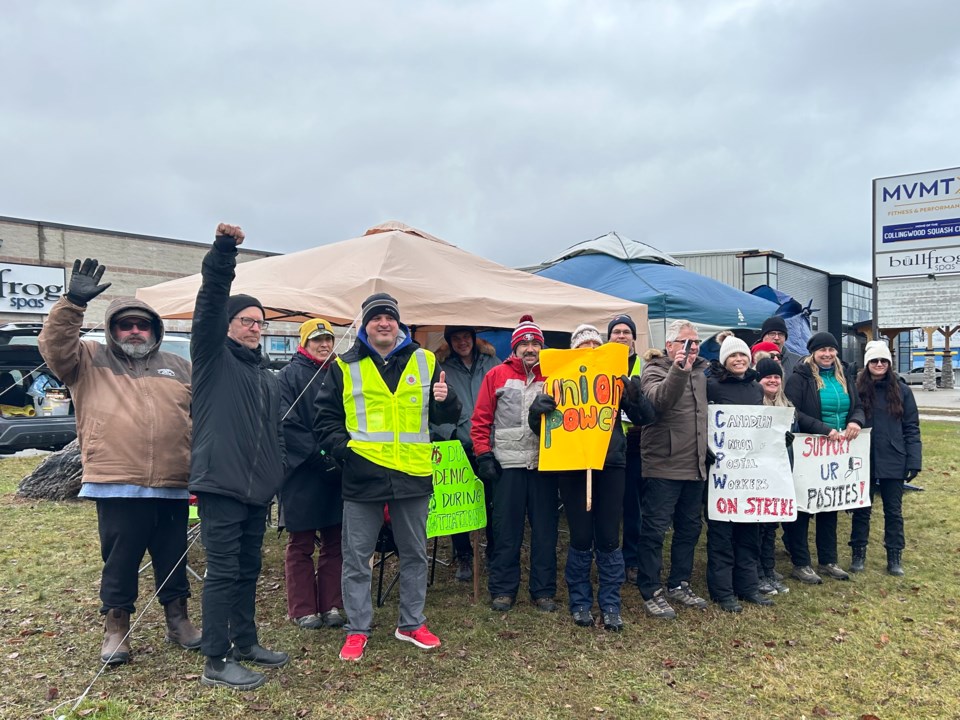Collingwood's posties are feeling the love on the picket line as the Canadian Union of Postal Workers (CUPW) strike enters its second week.
Bargaining continues but there are no deliveries going out, with the exception of some government cheques that did get delivered.
In Collingwood, Canada Post workers have set up on High Street in front of the local sorting facility, where they say they've been getting hot coffee, doughnuts, pizza and supportive horn honks from passersby.
Nicholas Schaut, a shop steward with Local 521, said the mood at the local picket line is upbeat, and that workers are fighting for all labourers.
"Canada Post wants to radically change the processing of mail delivery ... The consequence of that would be the loss of more full-time workers and an increase in part-time and temporary workers," said Schaut in a roadside interview on Friday, Nov. 22.
"You're seeing what's happening with the gig economy and how that's affecting workers through this country and ... as a union member, our goal is to enhance the opportunities for all workers, not just CUPW," said Schaut. "When we have a corporation ... it's a Crown corporation, so the extension of a government system trying to actually force workers into more difficult economic conditions and reducing the opportunity for full-time work, that's really counterintuitive."
The strike involves about 55,000 employees, all represented by CUPW, who walked off the job on Friday, Nov. 15.
The strike issues include wages — the union has called for a cumulative wage hike of 24 per cent over four years, while Canada Post has offered an 11.5 per cent increase — job security, benefits and parcel delivery on weekends.
The union wants weekend work done by full-time employees; Canada Post's plan is to hire contract workers.
Negotiations between Canada Post and its unionized employees began in November 2023.
Schaut, a 23-year veteran employee with Canada Post, said wage increases and cost of living have been "a joke" and employees are taking a hit in their wages because they haven't kept up with inflation, or the changing work.
He said letter volume has declined, but there's been a "dramatic increase" in parcel volume and ad mail volume.
"We're delivering more weight per day than we ever have," said Schaut.
He acknowledged Canada Post's financial woes, among other issues of a changing world of deliveries, but he said that's a problem that starts, and can be solved, at the top.
"We have 21 executive positions, 14 of which are vice-presidents, two senior vice-presidents and the balance are directors and the CEO. All of these individuals are making a tremendous amount of money," said Schaut.
Yet, he said, they failed to properly plan for parcel delivery and the eventual loss of Amazon's delivery contracts.
"I really call into question the executive level of Canada Post and their true ability to predict forecasting for Canada Post," said Schaut. "Many of us believe there should be an inquiry into the management system of Canada Post."
The money and the problems are top-down, according to the Collingwood shop steward.
"The bonuses go to management; they don't come down to us," said Schaut. "We put our lives on the line on almost a daily basis during COVID and with very little recognition from Canada Post. We really need to change the way people view labour."
He said the union wants Canada Post to keep its hands off their pensions so workers know they will be able to retire.
"We're seeing an increase in senior poverty, and we need to address this, and one of the ways is through appropriate, well-funded pension structures," said Schaut. "We're fighting for something for all of us and not just the rich."
Canada Post is proposing a switch to a defined contribution plan over a pension plan.
Schaut said those who want to support the postal workers can reach out to their MPs to encourage support for the unionized workers and to ask more questions.
The last postal work stoppage took place starting in late October 2018, when employees carried out rotating strikes lasting 31 days.
That strike as well as one in 2011 ended when the federal government passed legislation sending employees back to work.
Schaut said he and his fellow workers are prepared to get back to work, knowing there will be a backlog of parcels and mail because of the holiday season.
— With files from The Canadian Press
